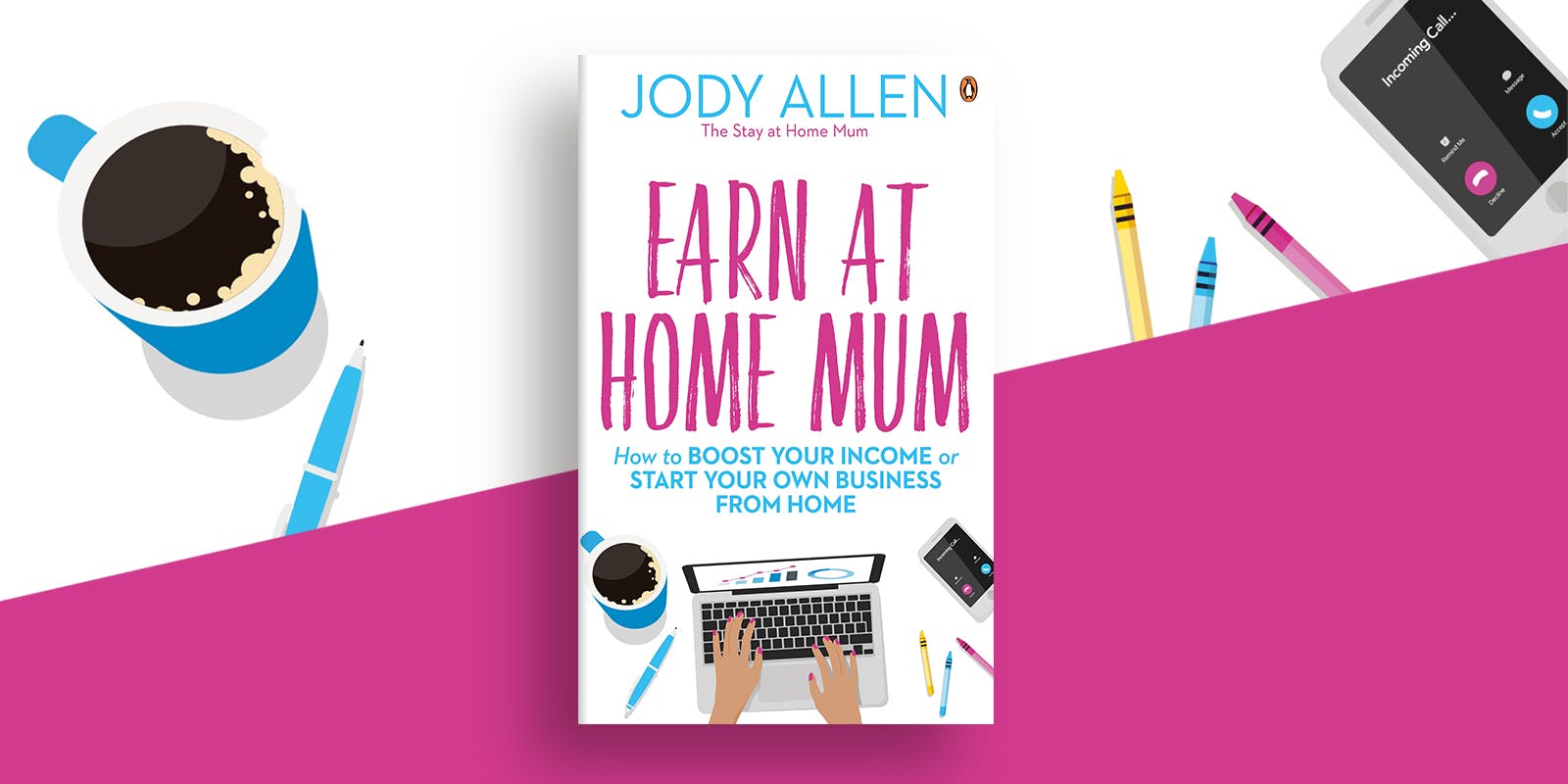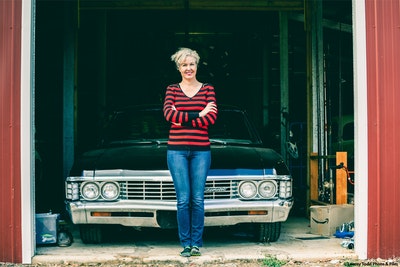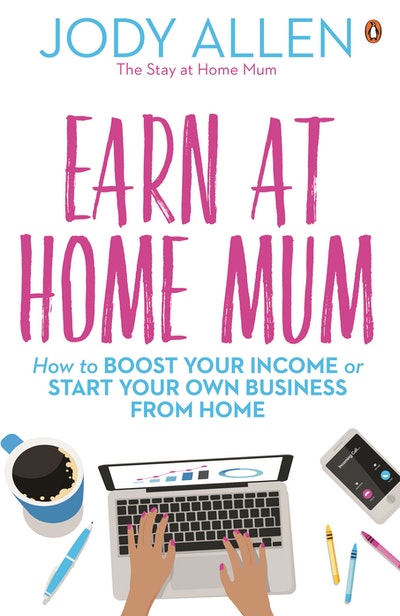Tips from Stay at Home Mum on how to blog for a profit.
When Jody Allen was made redundant in 2009, while pregnant with her second child, she started a website, Stay at Home Mum, to connect with other mums. From humble beginnings the money-saving and parenting tips blog grew into Australia’s biggest mothers’ network. Not only does Jody get to connect with hundreds of thousands of women online, she also earns a profit and has turned the business into an inspiring online brand.
Jody says in the introduction of Earn at Home Mum, ‘If I can create something out of nothing and turn it into a successful business that is now paying my mortgage and putting way more than $50 worth of food on the table every week for my family, there’s no reason why you can’t take a passion of yours and find a way to make an income from it.’ Read on to find out how you can find your blogging niche and monetise it.
A blog can take lots of forms, but usually it’s an individual’s website about their life or a specific topic with stories about what they’ve been up to, with accompanying photos. For example, a lot of bloggers write about travel, cooking, their families and their homes. Sometimes they’re just for fun, but the really successful bloggers with a big following can make decent money from their blog through advertising, affiliate links (see Chapter 11) and even book deals and so on. Chances are, you already know someone who has a blog. Starting your own site from scratch may seem like an awfully daunting notion – but it’s really fun to have your very own piece of the internet! If you think about it, you never really own a Facebook page or Instagram account because of the nature of those platforms, but a website is an asset – your saleable asset. And the more work you put into it, the more articles you write and the more followers you accumulate, the more that website will be worth!
How much income can you really make blogging? Well, my answer is, how hard do you want to work? I have been blogging as my only source of income for ten years now. Yes, it is hard work; yes, I put an incredible amount of time into it. But I really enjoy it – I find it so much fun to wake up in the morning and think, ‘What am I going to write about today?’
Successful bloggers all seem to have a few traits in common:
- They are often people who are easily bored. That is, normal work just doesn’t hold their attention.
- They are do-ers.
- They go against the grain of what is considered ‘normal’.
- They are tenacious – they don’t give up.
- They ask questions. And no questions are ever silly.
- They are true to themselves.
- They love being told ‘You can’t do that!’ and proving everyone wrong.
Great bloggers make money because they don’t give up and they do what needs to be done. But just a word on money – I didn’t take a wage for the first two years of running my blog. Every cent my blog made was re-invested into making the blog bigger and better, by adding features, making it more user-friendly and paying other writers to contribute to the content. This in turn made the blog more popular, so it made more money, and so the wheel goes round. So if you don’t have a huge amount of cash to invest in your blog (and that’s okay), the reality is that you have to put in the time and hard work instead, especially if you want your blog to become your full-time job.
You need a clear strategy for starting your blog and monetising it if you want to make money, and that’s what this chapter is all about. Blogging is just like any other business out there. You get out of it what you put into it – including your time, your energy and your passion.
Find your blog niche
As mentioned, a lot of blogs are just about you, your lifestyle and what you’re doing – a bit like a diary. These blogs are fun, but rarely profitable. On the other hand, having a niche blog on one particular topic – now, that’s where the money is! Niche bloggers often become experts on their topics. A journalist or writer may seek a blogger’s expertise for interviews; this will also help build an audience.
What do you want to blog about? Sometimes you will know before you start, other times you have to find your niche. Have a really thorough brainstorming session about what you write about consistently (and what you can monetise well). Writing about a topic that you’re passionate about is a damn good start – your passion for your topic will show through and help you connect with followers. Is there a blog you follow but whose topic you think you could do a better job with? Checking out your potential competition is a great way to get ideas for what you like and what you don’t.
Bloggers are often divided into two camps – the ‘experts’ in a particular field, and those ‘learning along the way’. You don’t need to be a expert if you write about your journey. In fact, the bumps along the way often make the best content as readers will relate to your story.
Some niche ideas include:
- A diary of your travels
- Business strategies
- Fishing, sport or dance
- Fashion for plus-size women
- Cooking, cleaning or parenting
- Real estate
- Dating and relationship advice
- Crafts, including sewing, knitting and crochet
- Health and wellness
- Weight loss
- Vegan living
- Ethically or sustainably sourced lifestyle
Monetise your blog
Okay – this is the big question. I know, I know, I keep talking about monetising your blog, but what does that actually mean? How does a blog make money? Well, the answer is in a lot of ways.
Once you’ve got some consistent traffic to your site, you can start looking at monetisation through a few different means. One of the simplest to is sell advertising space to other companies, usually in the form of ad banners that link through to the advertiser’s own website. Another major source of income for bloggers is affiliate links (see Chapter 11) and sponsored posts. Additional revenue streams you might add down the track if your blog is your core business include selling products or services (see Chapter 8), or you might be adding a blog to support an existing online shop and attract new buyers.
You’re probably wondering how I monetised the Stay at Home Mum website. I use a combination of:
- Banner advertising
- Affiliate marketing
- Sponsored posts
- Product reviews
- Ebooks or digital downloads
Of course, not everyone who tries blogging is able to make a sustained income. However, perseverance and commitment will help increase your chances, especially if you have a kick-ass topic that people want to read about. The amount of work and effort you should put into your blog may be more than you had imagined at the beginning, especially when you’re trying to kickstart it. Using a combination of methods is a good idea as most of them take a while to get established before you earn real money. Here is some more detail on these different revenue streams.
Banner advertising
Banner advertising is the ad blocks located at the top and down the sides on most websites these days. You can ‘sell’ the space on your website to specific companies who want to advertise to your readers or you can use a program such as Google AdSense that actually fills those spaces with available advertisements for you. Going through Google AdSense will generally earn you less money overall, but it does save a ton of time, as well as the trouble of finding suitable advertisers.
If people reading your blog click on an advertisement on your website, you get paid ‘per click’. Some clicks are worth more than others. Most clicks are worth somewhere between 20c and $100 – it all depends on what niche you cover, what your customer is looking for and what the advertisement is. For example, a fashion outlet might get 5c per click, because fashion is popular and loads of people will click on it. Meanwhile, a brain surgeon advertisement – which is rarer – will get a much higher per-click rate, because it’s a niche.
It’s easy to set up a Google AdSense account, but you may have to get a developer to install the code for the advertisements (or closely follow the step-by-step instructions on YouTube). Once done, it’s pretty much set-and-forget, and the money appears in your bank account every month – provided that some readers click on the advertisements.
Sponsored posts
A sponsored post is where an advertiser has paid you to write and post an article on your blog. It usually involves you mentioning a specific product or service and why you like it, and generally you agree as part of the deal to include photos and a link to buy the product or service. This is a longer form of the sponsored social media post, which we’ll look at in Chapter 9. These articles could be about anything – think a new variety of yoghurt through to car insurance through to a fitness shoes – but always make sure that the product or service that you choose is a good fit for your audience. Blog readers expect to see sponsored posts but they’ll think you’re a sell-out if you are always posting random things that have nothing to do with your blog. If you can cleverly weave the product or service into you posts in a way that will appeal to your customers, you are selling the advertiser’s wares and that’s worth money to them.
Bloggers can charge anywhere from $5 to $10,000 for a sponsored article depending on their traffic. Expect to start on the lower end of this and work your way up as your blog becomes more popular.
Product reviews
Product reviews are where you are sent a product or given the chance to use a service, which you then provide assessment and feedback for. It’s similar to doing sponsored posts but it’s more about writing your honest feedback than selling the product – though, of course, the company who sent you the product hopes that you’ll write a positive review to help generate sales for them. You’re also less likely to get paid actual money for this, though if you have a substantial audience that the organisation really wants to reach, this becomes more likely.
Many newbie bloggers do product reviews in exchange for the product or service in the hope that that advertiser might pay for the privilege later on, but in all my years of blogging, I have never been paid by an advertiser who ‘promises future payment for reviews’. It just doesn’t happen. I’m not saying that you shouldn’t take products in exchange for reviews only – that’s up to you. It can be a good way to get content for your site and try new products, but unless you negotiate to get paid for your review, you’re not going to earn cash.
Ebooks or digital downloads
Offering products for download on your blog are a fantastic way to earn some money – but of course you need the products and the functionality to sell things through your website. Check out Section 4.2 for my rundown about downloadable products you can sell.














